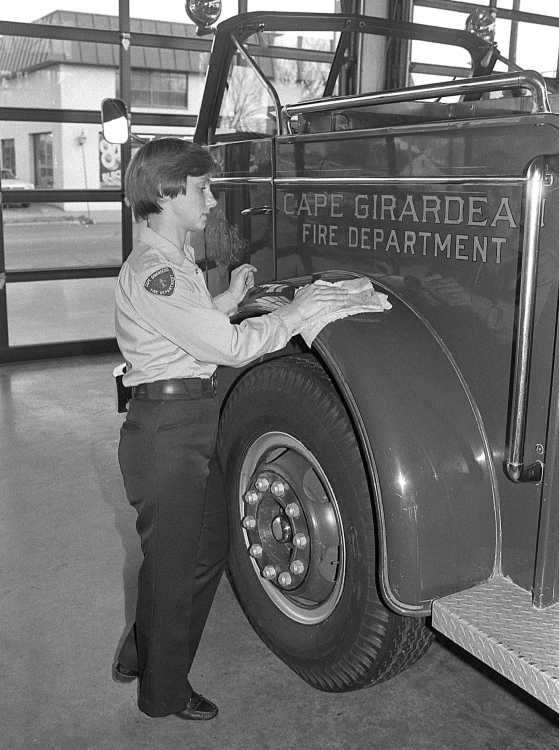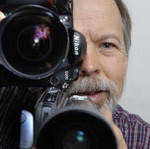- -30- then and now (8/22/18)2
- Meet Mable at Mable's Cafe in Chaffee (8/20/18)
- Willow Grove Rockets Skate Club (8/15/18)
- Central Municipal Pool built in 1979 (8/13/18)
- Hecht's Store founder returns to Main street (8/8/18)
- Land acquired to build SEMO Port (8/6/18)
- St. Vincent's Seminary ends after 136 years (8/1/18)1

Dec. 11, 1983 Southeast Missourian
Mary Mosebach, like her co-workers, carries out her morning routine of cleaning chores at Fire Station 1. As the first female firefighter hired by Cape Girardeau, her first year on the job has taught her there is a lot more involved in fighting fires than she thought. After a call, all the equipment has to be cleaned and inspected immediately for the next call that could come anytime. (Pat Swann photo)
Female firefighter: Mary Mosebach evaluates her first year as a firefighter for Cape Girardeau and looks at future
By Pat Swann
Missourian Staff Writer
The old saying "if you can't stand the heat, get out of the kitchen" is good advice for most of us. But for Mary Mosebach, it was the "heat" that fired her enthusiasm for a new career.
Last week Mosebach completed her first year of duty as a firefighter at Fire Station 1 here. As the first female firefighter hired by the city, she also joins a miniscule percentage of female firefighters nationwide--about 500 out of approximately 180,000.
After teaching in the Scott City school system for almost 10 years as a special education teacher, the idea of trying something new was tempting. The prospect of being a firefighter seemed to fill the bill, she recalls.
With undergraduate and masters degrees from SEMO State University in the area of special education, friends couldn't understand the change at first. "One of the most frequently asked questions is 'How could I leave my job as a teacher,'" she recalls. "My answer is that I'm not giving up education, I'm just channeling my job interests into something else." Her decision, she feels, was just a willingness to admit she had developed new interests as the years passed: "Why should I be bound by a decision made when I was 18?"
She is quick to point out that even the job of a firefighter includes educational skills. The station gives tours to all age levels, starting with preschoolers on up to senior citizen groups.
"I really hope to bring my background in education into my job as much as possible. Besides the tours of the station, she foresees the possibility of expanding into educational programs on fire safety for all age levels. During the year she has even gone into the schools and taught fire safety on her own time, including a visit to her daughter's kindergarten class.
The slim 30-year-old rookie, however, hasn't spent all her time giving tours. She is a firefighter, as the name states. She gets just as dirty and tired as her co-workers and hangs on to the back of the fire truck like the others.
When she was hired, there was a lot of press coverage on her. "The press," referring to call-in columns published in newspapers, "indicated that I was getting a lot of flack because I was hired instead of a man. I saved all those comments," she says with a laugh, recalling the period. She competed successfully for the position with 130 other applicants.
Ever since day one she says the treatment has been "fair-and-square" by her superiors and "all of the guys are very supportive." At the beginning she admits to being self-conscious and felt she had to prove herself to the others. But as it turned out, "I was not expected to do more or learn more than the others. If I made a mistake it was because I was a rookie and not because I was an empty-headed female."
After one year on the job she describes her new career as "the multi-spokes of a wheel." There's a lot to learn, she says. "That's one of the things I didn't realize at first...how much was involved in being a firefighter."
Mosebach realizes now that she never left the field of education. "There are a lot of skills that you wouldn't normally use unless you are a firefighter," she says. Even small factors are important: "It helps to know how much hose line will be needed for a particular fire, estimating the distance of a building to the water source, the distance between floors, what size ladder to use, what construction materials are you dealing with. While training, we may spend days learning how to tie different knots used to haul equipment and knots for lowering victims."
When there are no fire calls, firefighters spend their afternoons in "school" covering various aspects of firefighting, fire prevention and safety. There are also practice fires, search and rescue drills during monitored fires. There are tests, too. Tests are given on street names and block numbers throughout the city, and firefighters are required to learn where hookups for sprinkler systems on commercial buildings are located.
The morning routine begins at 7 a.m. doing cleaning chores at the station. That includes anything from painting to stripping and waxing, says Mosebach. There are also routine checks on all trucks to make sure equipment is in working order.
The end of the working day doesn't technically end until 7 a.m. the next day. However, after 5 p.m. firefighters are given free-time to relax until the morning, if there isn't a call. While on duty, you're required to stay at the station, she says. For privacy, she has a partitioned area in the dormitory and a separate shower facility.
While 24-hour shifts can be taxing, with as many as seven calls in one day, the job also provides several days off. "It was tough to adjust to the schedule simply because the work was concentrated in one day. You really have to plan ahead for things you need to do" since firefighters are required to stay at the station while on duty. The days off have provided more time to spend with her two children, Jill, 3, and Kristine, 5. When she works, they spend the time with a babysitter.
Another adjustment was the lack of female companionship. As a teacher "there were always friends to go out to lunch with and set up garage sales with." As a woman working with men, it is difficult to find the same kind of friendships. "I see them (male firefighters) as able to develop friendships which would extend beyond working hours." This lack of female companionship "doesn't really bother me but I am aware of it," she says.
Although the job requires a certain amount of toughness, she is still a woman and a mother. She is still looking for a shampoo that will rid the smokey smell from her hair. "I think it's a treat to dress up and I wear dresses and skirts whenever I get the chance now."
Despite the drawbacks that come with any job, Mosebach is content with her new-found career and plans to stick to it for the next several years. "I've gained confidence in myself and it (the job) has humbled me...realizing how much there is to learn and how little I know. I'm looking forward to other years in the department, but I don't feel bound to it," point out "life is too short to get locked into one lifestyle."


Respond to this blog
Posting a comment requires a subscription.